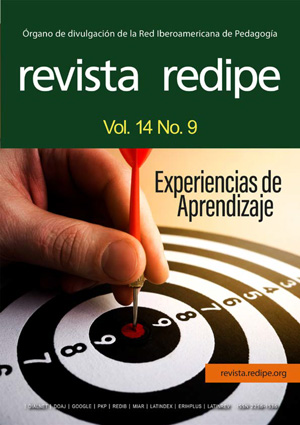Ability to evaluate learning methods in a rural context: Spatial thinking in pandemic season
Main Article Content
Keywords
Spatial thinking, GeoGebra, Ability to evaluate methods, Rigid transformations
Abstract
This article condenses the results obtained from the research on the “ability of seventh grade students to evaluate methods mediated by GeoGebra for the development of spatial thinking”, by applying a pedagogical proposal based on the use of the rural post-primary method and the application of ICT, where their learning is favored. Therefore, the main purpose was to develop the spatial thinking of the seventh grade students of Cerritos Educational Institution through the implementation of a pedagogical proposal mediated by GeoGebra and the ability to evaluate learning methods. Therefore, an experimental research with a quantitative approach of descriptive type is carried out, where the sequence is followed by the phases of: diagnosis, design, implementation and observation and validation. Therefore, the intervention sample was demarcated with a total of eleven seventh grade students of EI. Cerritos. The importance of the use of ICT in rural school contexts, generate a significant change for the learning of mathematics. Therefore, a significant advance is generated in the development of students’ spatial thinking, through the proposed pedagogical proposal (based on work guides for rural post-primary and use of ICTs with the GeoGebra software). Hence, the students, through the ability to evaluate learning methods, had the ability and obligation to determine which method could contribute to their learning process of rigid transformations in the rural context. Therefore, they expressed the undeniable need to articulate the post-primary rural method with that based on ICTs.
References
Álvarez, C; Cordero, J; González, J & Sepúlveda, O. (2019). Software GeoGebra como herramienta en enseñanza y aprendizaje de la Geometría. EDUCACIÓN Y CIENCIA, (22), 387-402. Recuperado de: https://revistas.uptc.edu.co/revistas/ index.php/educacion_y_ciencia/article/ view/10059
Cáceres, G. (2017). Aprendizaje de traslaciones en el plano fundamentado en el modelo de Van Hiele, mediado por Geogebra. Paideia Surcolombiana, (22), 78-96. Recuperado de: https://doi. org/10.25054/01240307.1325
Camargo, E, P; Camargo, E & Meza, L. (2017). Uso de las TIC’s en los procesos de aprendizaje de estudiantes en instituciones de educación básica secundaria. Revista ESPACIOS Vol. 38 (50), 2017, 9. Recuperado de: https://www.revistaespacios.com/ a17v38n50/17385009.html
Cardeño, J; Muñoz, L; Ortiz, H & Alzate, N. (2017). La incidencia de los Objetos de Aprendizaje interactivos en el aprendizaje de las matemáticas básicas, en Colombia. Trilogía Ciencia Tecnología Sociedad, 9(16), 63-84. Recuperado de: https://doi.org/10.22430/21457778.182
García, B. (2015). Competencias matemáticas, expectativas de aprendizaje y enculturación matemática. Escenarios, 13(1), 22-33. Recuperado de: http:// dx.doi.org/10.15665/esc.v13i1.549
Hernández, R; Fernández, C & Baptista, M. (2014). Metodología de la investigación, sexta edición. McGRAW-HILL / INTERAMERICANA EDITORES, S.A. DE C.V. México. Recuperado de: http:// observatorio.epacartagena.gov.co/wpcontent/uploads/2017/08/metodologiade-la-investigacion-sexta-edicion. compressed.pdf
Leal, Y. (2015). Ambiente virtual de aprendizaje en el área de matemáticas en modelo flexible postprimaria grados sexto y séptimo, para fortalecer el trabajo colaborativo. Revista Virtual Universidad Católica del Norte, 46, 47- 59. Recuperado de: http://revistavirtual. ucn.edu.co/index.php/RevistaUCN/ article/view/697/1225
Martínez, D & Márquez, D. (2014). Las habilidades investigativas como eje transversal de la formación para la investigación. Tendencias Pedagógicas, 24, 347- 360. Recuperado de: https://revistas. uam.es/tendenciaspedagogicas/article/ view/2110
Mogollón, J. (2013). Un problema de alturas en el Guaviare. REVISTA CIENTÍFICA Y TECNOLÓGICA / ISSN 0124 2253, Bogotá DC, 523-527. Recuperado de: http://funes.uniandes.edu.co/6690/
MEN. (2018). Informe por colegio del cuatrienio: análisis histórico y comparativo 2018 I.E. CERRITOS. Colombia.
Reyes, O. (2013). Desarrollo de habilidades investigativas de los estudiantes que cursan el bachillerato en línea. Revista mexicana de bachillerato a distancia, 5 (10), 126-134). Recuperado de: http:// revistas.unam.mx/index.php/rmbd/ article/view/44233
Villarreal, J; Muñoz, G; Pérez, H; Corredor, A; Martínez, E & Porto, A. (2017). El desarrollo de habilidades investigativas a partir de resolución de problemas. Las matemáticas y el estado nutricional de los estudiantes. REVISTA LASALLISTA DE INVESTIGACIÓN - Vol. 14 No. 1 – 2017, 162-169. Recuperado de: http:// repository.lasallista.edu.co:8080/ojs/ index.php/rldi/article/view/1359



